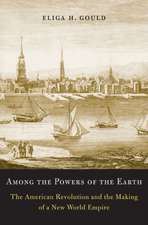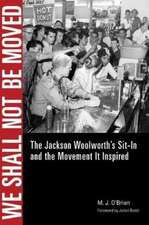Venezuela: Latin America in Focus
Autor Elizabeth Gackstetter Nichols, Kimberly J. Morseen Limba Engleză Hardback – 13 oct 2010 – vârsta până la 17 ani
Preț: 452.48 lei
Preț vechi: 780.24 lei
-42% Nou
Puncte Express: 679
Preț estimativ în valută:
86.59€ • 89.89$ • 72.20£
86.59€ • 89.89$ • 72.20£
Carte tipărită la comandă
Livrare economică 22 martie-05 aprilie
Preluare comenzi: 021 569.72.76
Specificații
ISBN-13: 9781598845693
ISBN-10: 1598845691
Pagini: 476
Ilustrații: 95 bw illus
Dimensiuni: 178 x 254 x 33 mm
Greutate: 1.13 kg
Editura: Bloomsbury Publishing
Colecția ABC-CLIO
Seria Latin America in Focus
Locul publicării:New York, United States
ISBN-10: 1598845691
Pagini: 476
Ilustrații: 95 bw illus
Dimensiuni: 178 x 254 x 33 mm
Greutate: 1.13 kg
Editura: Bloomsbury Publishing
Colecția ABC-CLIO
Seria Latin America in Focus
Locul publicării:New York, United States
Caracteristici
A chronology goes beyond a simple listing of historical events to include events of literary, artistic, and cultural interest, as well as those of historical, economic, and political interest
Notă biografică
Elizabeth Gackstetter Nichols is professor of Spanish and chair of the Department of Languages at Drury University, Springfield, MO. Kimberly J. Morse is associate professor of history at Washburn University, Topekas, KS.
Cuprins
About the Authors,Preface,1 Geography,Death in El Dorado,Geographic Overview,The Maracaibo Lowlands: Fountain of Black Gold,The Mountains of the West and North: From Andes Towns to Capital City,Beaches, Oil, and Coffee!,Following the Orinoco River to the Guiana Highlands: The Lost World,The Orinoco Plains,Amazonas and the Far South,2 HISTORY,Timeline,Colonial Beginnings,The Established Colony and Colonial Institutions,Independence,The Long 19th Century,Mi Benemérito Juan Vicente Gómez,Oil,Gómez Is Dead: Now What?,The Trienio (1945-1948),Marcos Pérez Jiménez,Punto Fijo,The Good, the Bad, and the Ugly of Partidocracia,The Very Ugly 1980s,3 GOVERNMENT AND POLITICS,Branches of Government and Governmental Structure,Federal and State Structure,Political Parties,Electoral System,Constitution,An Overview of Formative Events in Recent Venezuelan Politics,The End of Puntofijismo and the Economic Crisis,The First Military Coup Attempts,1998 Presidential Elections,New President, New Constitution, Megaelections,New Policies, New Projects,The 48-Hour Coup or the Chamber of Commerce Coup,The Recall,The Lesson of Social Polarization,The "People's President" and Civil Society,Chávez and Bolivarian Revolution: Successes and Failures-Trying to Occupy the Barren Middle Ground,Democracy and the Democratic Process,Poverty and State Spending on the Poor,4 ECONOMY,Overview,A Note on the Informal Economy,Industry,Neoliberalism,Labor,Economics and Politics in the Chávez Era,Trade and Finance,Land Reform,Conclusion,5 SOCIETY,Introduction,Religion and Thought,Religion and Religiosity,The Catholic Church in the Colonial Era,Church, State, and Society in the 19th and 20th Century,Popular Religion and Religiosity,María Lionza,Protestantism in Venezuela,Practical Religiosity,Social Classes and Ethnicity,Who Is Venezuelan?: Race and Class in Venezuela,Indigenous Venezuelans in the Colonial Era,Slave and Free, African and Mixed Race in Colonial Venezuela,White Venezuelans in the Colonial Era,Living Together in the Colonial Era,Establishing the Rules about Coexistence and Interaction after Independence,Indigenous Venezuelans in the 19th Century,Blurring the Line between Race and Class,Women and Marriage,Oppression and Adoration: Women in Education, Politics, and Beauty Pageants,Public versus Private: Social and Historical Context,Current Political and Social Status,Education and Income,Marriage and Health,Politics,The Dividing Line of Social Class,The Goddess and the Queen,Oppression and Adoration: The Paradox,The Revolutionary Gay Movement: Seeking a Place for LGBT Rights in 21st-Century Venezuela,Education,Education: A Path to Modernization and Equality,Historical Background,Contemporary Overview,Exemplary Public Higher Education: The Universidad Central de Venezuela,Changes to the Educational System,Controversy and Opposition to Educational Changes,Conclusions,6 CULTURE,Introduction,Language,Preliminary Expansion and Domination of Castilian,Andrés Bello Cleans Up the Language,Modern Spanish in Venezuela: Would Bello Be Proud?,Indigenous Languages in Venezuela: Language Domination and Survival,Other Indigenous Languages,The Importance of English,Case Study: Little Venice,Etiquette,Respect and the Family,Etiquette and Growing Up,Etiquette, Family, and the Daily Rhythms of Life,Etiquette, Family, and Dating,Clothing,Parties and Other Gatherings, Formal or Otherwise,Time and Traffic,Etiquette and Language for Professionals,Literature,Andrés Bello: Writer, Philosopher, Jurist, Educator, All-Around Intellectual Hero,The 19th Century and Intellectual Autonomy,Women Writing the 20th Century and Beyond,Working Together: Literary Groups,Public Poetry and the Writer-Statesman,Art,Mysterious Rock Art,Armando Reverón Remakes the Venezuelan Landscape,Alejandro Otero and the Geometric Revolution,Soto and Cruz-Diez: Making Art Move,Gego and the Reticulated Image,Marisol: Pop Art with a Message,Javier Téllez: Video Passports to Other Spaces,Monuments to National Art and National Pride,Popular Art in 21st-Century Caracas,Music,Teresa Carreño: Classical Heroine,Classical Music in Contemporary Venezuela: Creating Opportunity,Popular Music: The National Sound,The Voice of the People: Community Radio and Contemporary Rap Music,Food,Corn and Rice,Fruits and Vegetables,Meat and Seafood,Beverages,Agricultural Production and Price Controls,Sports and Leisure,Baseball: The National Sport,Soccer,Other Sports,Leisure Activities,Festivals: Tradition and Modernity Combine,Popular Culture,The Most Popular of Culture: The Telenovela,Other Programs and Issues in the World of Venezuelan Television,Film,Pageantry and the Price of Beauty,Architecture,Vernacular Architecture,Colonial Architecture,The Advent of Professional Architecture,Misión Habitat: 21st-Century Approaches to Public Housing,7 CONTEMPORARY ISSUES,Internal Issues: Instability, Insecurity, and Human Rights,Political Instability,Corruption,Freedom of the Press and Freedom of Assembly,Electricity and Water Problems,Foreign Relations: Chasing Bolívar's Dream,Venezuela-Colombia Relations,Venezuela and the United States,Conclusions,Glossary,Facts and Figures,Major Venezuelan Holidays and Festivals,Country-Related Organizations,Annotated Bibliography,Thematic Index,Index,











